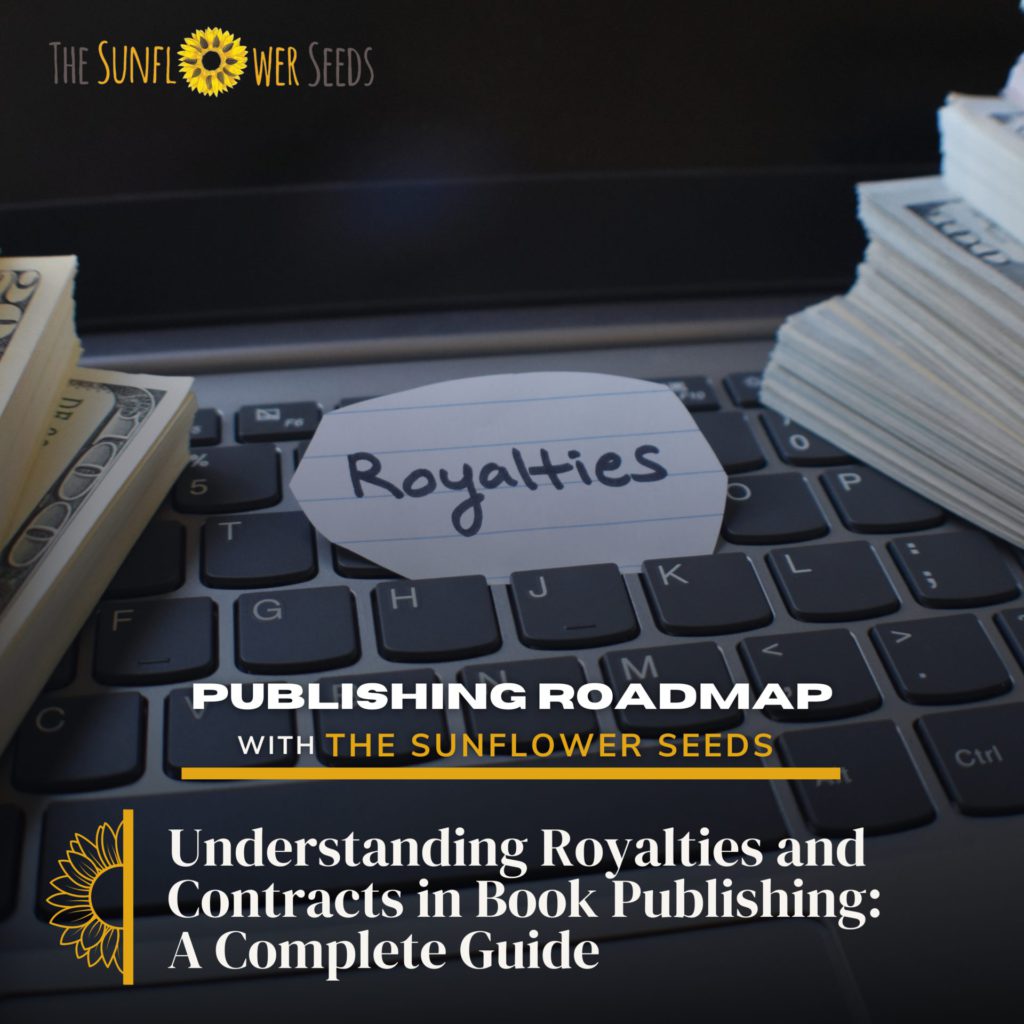Understanding Royalties and Contracts in Book Publishing: A Complete Guide
“Someday I hope to write a book where the royalties will pay for the copies I give away.“
— Clarence Darrow

For any author, whether traditionally published or self-published, understanding book royalties and publishing contracts is essential to making informed financial and career decisions. The publishing industry is competitive, and without a solid grasp of how royalties, advance payments, and contractual obligations work, authors may find themselves earning far less than they anticipated. If you’ve ever asked yourself, “How do book royalties work?”, “What is the average royalty rate for authors?”, or “How can I negotiate a fair publishing contract?”, you’re in the right place. Knowing how to structure a book deal, optimize royalty rates, and protect your intellectual property can make all the difference in the long-term profitability of your writing career.
At The Sunflower Seeds, we help authors navigate the complexities of book publishing, contract negotiations, and royalty agreements, ensuring they retain maximum rights while maximizing their earnings. Whether you’re considering traditional publishing, self-publishing, or hybrid publishing, understanding the financial and legal aspects of book publishing is crucial to protecting your rights and ensuring long-term success. With our guidance, you can make informed decisions about book pricing strategies, contract terms, and royalty structures, helping you create a sustainable and profitable writing career. Whether you’re targeting the book market in Mumbai, Delhi, and Jaipur or looking to distribute globally, having a well-structured contract and an optimized royalty model is key to making the most of your book sales.
What Are Book Royalties and How Do They Work?
Royalties are the earnings an author receives from book sales. The amount varies depending on the publishing model—traditional publishing, self-publishing, or hybrid publishing—and the distribution method, whether it’s print, eBooks, or audiobooks.
In traditional publishing, authors usually receive an advance payment (a lump sum paid upfront) and then royalties on book sales once the book has earned back the advance. The average royalty rate for traditionally published books is 10–15% for hardcover sales, 5–7.5% for paperbacks, and 25% for eBooks. However, contracts can vary widely, so it’s important to read the fine print and understand how much you’ll earn per book sold.
For self-published authors, royalties work differently. Platforms like Amazon Kindle Direct Publishing (KDP), IngramSpark, and Draft2Digital offer higher royalty rates—typically 35% or 70% for eBooks and 40–60% for print books—but authors must handle editing, design, and marketing costs themselves. While self-publishing provides greater control, authors must carefully calculate costs to ensure they remain profitable.
At The Sunflower Seeds, we help authors analyze their options to determine the best publishing model that aligns with their career goals, ensuring they make the most of their book sales.
What Is a Publishing Contract and What Should You Look for?
A publishing contract is a legally binding agreement between an author and a publisher. It outlines royalty rates, rights ownership, distribution terms, and payment schedules. If you’re signing a contract with a traditional publisher, it’s crucial to understand the key clauses that impact your earnings and rights.
One of the most critical aspects of a contract is royalty structure. Some publishers offer tiered royalties, where rates increase based on the number of copies sold. Others may include clauses for deep discounts, allowing retailers to sell your book at lower prices—which can reduce your royalty earnings. Additionally, subsidiary rights (such as translation rights, film adaptations, and audiobook rights) should be carefully reviewed to ensure you’re compensated fairly.
Authors should also be cautious about non-compete clauses, which may restrict them from publishing similar works elsewhere, and termination clauses, which dictate how and when they can regain their rights if a publisher underperforms. Understanding royalty reports is another crucial factor, as publishers provide quarterly or biannual sales reports that determine an author’s earnings.
At The Sunflower Seeds, we assist authors in reviewing and negotiating contracts to secure fair terms and maximize earnings. Whether you’re signing your first book deal or renegotiating an existing contract, having expert guidance can make a significant difference.
How Do Self-Publishing Royalties Compare to Traditional Publishing?
The biggest difference between self-publishing and traditional publishing royalties is the percentage of earnings per sale. Self-published authors earn a much larger share of each book sale but must cover production, marketing, and distribution costs upfront.
For instance, on Amazon Kindle Direct Publishing (KDP), authors can choose between 35% or 70% royalties depending on the price of their eBook. To qualify for the 70% royalty rate, books must be priced between ₹99 and ₹499. If an eBook is sold for ₹299, the author receives ₹209 per sale at a 70% royalty rate, compared to ₹104 at a 35% rate. However, self-published authors must also account for printing and delivery costs for physical books, which can lower overall profits.
In traditional publishing, while the royalty rate is lower, authors receive an advance payment and benefit from the publisher’s distribution and marketing resources. If a traditional publisher offers a ₹2,00,000 advance, the author does not receive additional royalties until the book has sold enough copies to “earn out” this advance. This means authors must calculate the long-term earning potential of both publishing models to determine which suits them best.
At The Sunflower Seeds, we help authors compare self-publishing vs. traditional publishing earnings, ensuring they choose a path that maximizes their income and career growth.
How Can Authors Negotiate Better Royalties and Contract Terms?
Many authors believe that publishing contracts are non-negotiable, but that’s not true. While large publishers may have standard contract templates, authors can still negotiate key terms to improve their earnings and protect their rights.
One of the most negotiable aspects of a contract is the royalty rate. If an author has a strong platform, social media following, or previous sales success, they have more leverage to demand higher royalties or a bigger advance. Additionally, authors can negotiate rights retention, ensuring they maintain audiobook, translation, and film rights instead of signing them away for low compensation.
Authors should also request transparency in royalty reporting. Some publishers provide vague or delayed sales data, making it difficult for authors to track their earnings. A well-structured contract should include clear reporting terms, specifying when and how sales data will be shared.
At The Sunflower Seeds, we work with authors to develop contract negotiation strategies, ensuring they receive the best possible deal. Whether you’re signing with a traditional publisher or a hybrid publisher, securing fair royalties and contract terms is essential to long-term success.
Conclusion: How Can Authors Maximize Royalties and Secure Fair Contracts?
Understanding royalties and publishing contracts is critical for every author looking to make a sustainable income from writing. Whether you’re exploring self-publishing, traditional publishing, or hybrid publishing, knowing how royalties work helps you make informed decisions about your book’s pricing, distribution, and earnings potential.
By carefully reviewing royalty structures, contract clauses, and subsidiary rights, authors can avoid unfair terms and ensure they retain control over their work. With self-publishing platforms like Amazon KDP and IngramSpark, authors now have more options than ever to maximize their earnings, but navigating the complexities of royalty payments and contract negotiations requires careful planning.
At The Sunflower Seeds, we help authors analyze book royalties, review publishing contracts, and develop pricing strategies to maximize their book sales. Whether you’re negotiating a deal with a traditional publisher or optimizing your self-publishing royalties, having the right guidance ensures you earn what you deserve.
If you’re ready to take control of your publishing career, contact The Sunflower Seeds today for expert advice on royalties, contracts, and book sales strategies. Whether you’re targeting the book market in Mumbai, Delhi, or Jaipur, or aiming for global book sales, we ensure you make the best financial decisions for long-term success.
Still stuck about pricing your book? Click on the link: “How to Price Your Book for Maximum Sales?”





